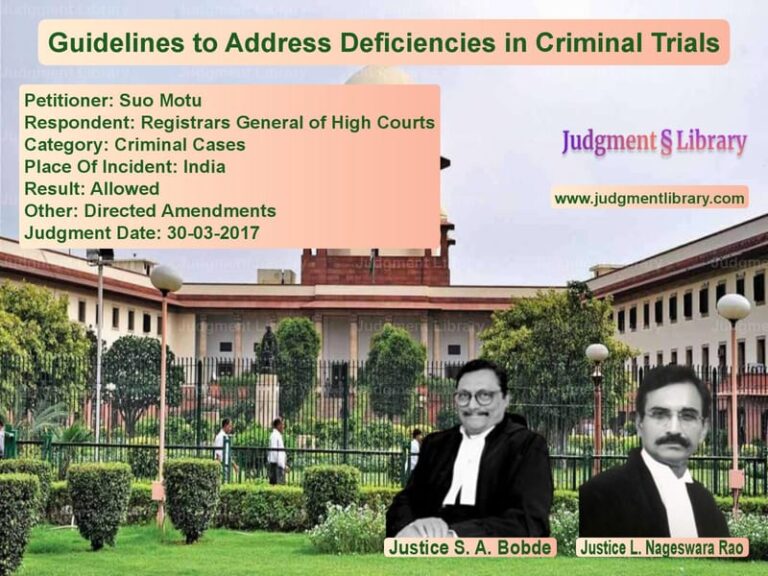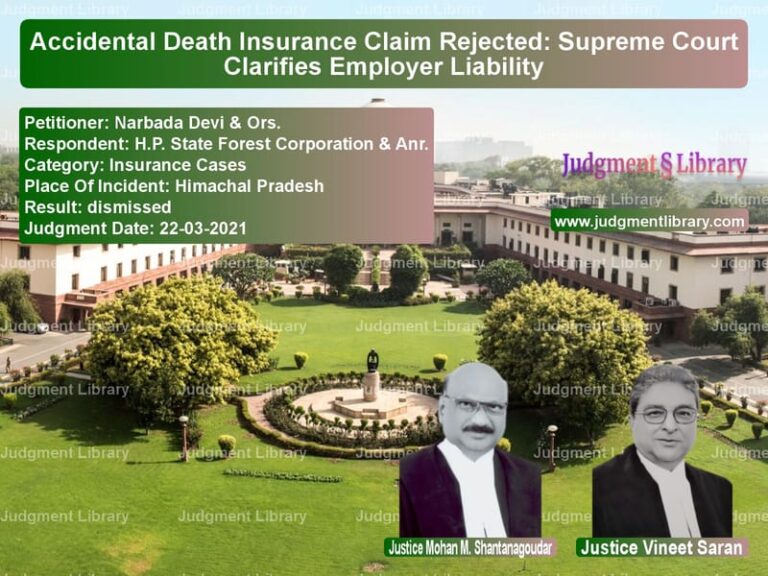POSH Act Implementation: Supreme Court Orders Nationwide Compliance
The Supreme Court of India recently delivered a landmark judgment in Initiatives for Inclusion Foundation v. Union of India & Others, addressing the widespread non-implementation of the Sexual Harassment of Women at Workplace (Prevention, Prohibition, and Redressal) Act, 2013 (POSH Act). The judgment mandates the Union Government, State Governments, and Union Territories (UTs) to ensure full compliance with the Act, setting a precedent for workplace safety and gender equality.
Background of the Case
The writ petition was filed by the organization Initiatives for Inclusion Foundation under Article 32 of the Indian Constitution, seeking directions from the Supreme Court to enforce the implementation of the POSH Act. The petition highlighted numerous deficiencies in compliance, including:
Read also: https://judgmentlibrary.com/supreme-court-upholds-senior-advocate-designation-under-advocates-act/
- Failure of states to appoint District Officers as per Section 5 of the Act.
- Non-constitution of Local Committees (LCs) in districts, which are essential for workplaces with fewer than 10 employees.
- Absence of Internal Complaints Committees (ICCs) in private and government workplaces.
- Lack of mechanisms for annual compliance reporting as mandated under Sections 21 and 22.
- Failure to publicize awareness programs about the Act.
The Supreme Court undertook a thorough review of affidavits submitted by various states detailing their steps toward compliance. However, these affidavits revealed glaring gaps and inconsistencies in implementation across the country.
Legal Issues Raised
- Whether the failure to implement the POSH Act violated constitutional guarantees under Articles 14, 19, and 21.
- Whether states had fulfilled their statutory duties to establish Local Committees and appoint District Officers.
- Whether compliance mechanisms, including reporting and monitoring, were in place as per the Act.
Arguments by the Petitioners
- The POSH Act was enacted to fulfill the mandate of Vishaka v. State of Rajasthan (1997), yet its implementation remained incomplete after a decade.
- Only a few states had functional Local Committees, leaving employees in the unorganized sector without redressal mechanisms.
- The absence of proper monitoring mechanisms, including annual compliance reports, rendered the Act ineffective.
- The failure of states to conduct awareness programs left many employees unaware of their rights.
Arguments by the Respondents (Union of India and State Governments)
- Several states had appointed District Officers, though some had not notified their contact details.
- Efforts were underway to improve compliance, but bureaucratic challenges slowed the process.
- The Union Government had issued advisories and guidelines, and it was the responsibility of state governments to implement them.
- The lack of centralized data on compliance was acknowledged, but states were gradually improving their reporting mechanisms.
Supreme Court’s Observations
The Supreme Court, in its analysis, referred to the objectives of the POSH Act and stressed that effective implementation was necessary for safeguarding the fundamental rights of women. The Court made the following key observations:
- The lack of compliance by states and UTs was a serious lapse in governance and violated women’s rights under Articles 14 (equality), 19(1)(g) (right to work), and 21 (right to life and dignity).
- The appointment of District Officers was not optional but a statutory mandate, and their failure to act crippled the redressal mechanism.
- Many states had failed to constitute Local Committees, leaving large segments of women workers, particularly in the unorganized sector, without any means of filing complaints.
- The lack of awareness campaigns rendered the Act ineffective, as many employees remained unaware of their rights.
Final Judgment
The Supreme Court allowed the petition and issued comprehensive directions to ensure the Act’s effective implementation:
- All states and UTs must appoint District Officers within four weeks and ensure they are trained to handle POSH Act-related complaints.
- Every district must constitute a Local Committee and publish its contact details within six weeks.
- All government and private sector workplaces must establish Internal Complaints Committees and report their compliance.
- District Officers must collect annual compliance reports from all workplaces and submit them to state governments.
- The Union Government must monitor and ensure state-level compliance and file a consolidated compliance affidavit within 12 weeks.
- State governments must launch large-scale awareness campaigns to educate employees about their rights and the complaint mechanisms under the Act.
Implications of the Judgment
The Supreme Court’s ruling has far-reaching implications:
- Enforces Accountability: States and UTs can no longer delay POSH Act implementation, as they must report compliance directly to the Union Government.
- Improves Workplace Safety: Ensuring ICCs and LCs are functional will provide a safe and structured grievance redressal mechanism for women employees.
- Increases Public Awareness: The mandated awareness campaigns will ensure employees know their rights and the redressal mechanisms available.
- Brings Uniformity Across India: The ruling establishes a standardized implementation framework, eliminating regional disparities in compliance.
This landmark judgment reinforces the importance of workplace safety and gender equality, ensuring that every employer complies with the POSH Act to create a harassment-free work environment.
Petitioner Name: Initiatives for Inclusion Foundation.Respondent Name: Union of India & Others.Judgment By: Justice S. Ravindra Bhat, Justice Dipankar Datta.Place Of Incident: India.Judgment Date: 19-10-2023.
Don’t miss out on the full details! Download the complete judgment in PDF format below and gain valuable insights instantly!
Download Judgment: initiatives-for-incl-vs-union-of-india-&-oth-supreme-court-of-india-judgment-dated-19-10-2023.pdf
Directly Download Judgment: Directly download this Judgment
See all petitions in Fundamental Rights
See all petitions in Public Interest Litigation
See all petitions in Judgment by S Ravindra Bhat
See all petitions in Judgment by Dipankar Datta
See all petitions in allowed
See all petitions in Modified
See all petitions in supreme court of India judgments October 2023
See all petitions in 2023 judgments
See all posts in Constitutional Cases Category
See all allowed petitions in Constitutional Cases Category
See all Dismissed petitions in Constitutional Cases Category
See all partially allowed petitions in Constitutional Cases Category






